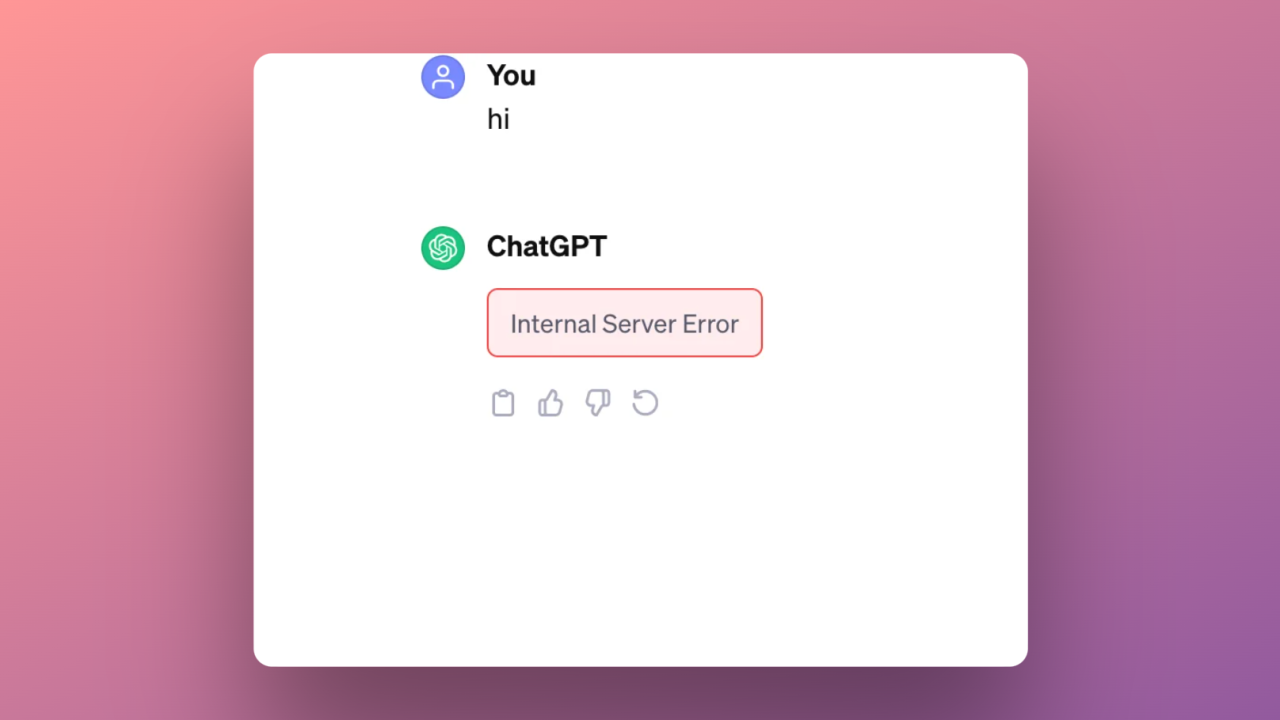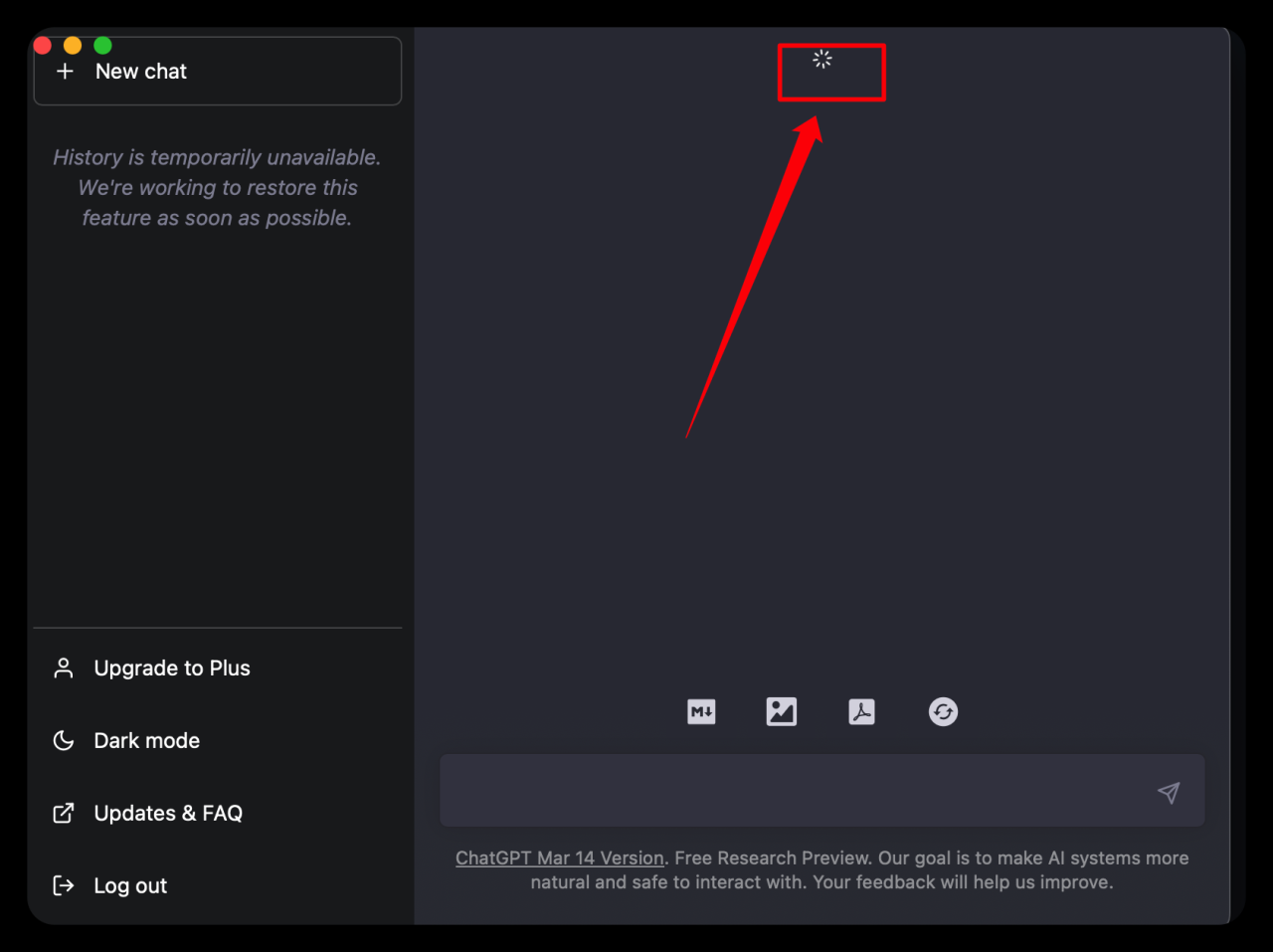Is chatgpt down – Is Kami down? That frustrating question plagues many users when their favorite AI assistant goes offline. This happens more often than you might think, due to various technical glitches, planned maintenance, or even overwhelming demand. Let’s explore the common causes, impacts, and solutions for when your go-to AI tool isn’t available.
Understanding why a service goes down is crucial for both users and providers. From simple troubleshooting steps to understanding the broader technical infrastructure, we’ll unpack the entire process. We’ll also cover how to minimize disruption and what to do when you’re suddenly without access.
Service Interruptions
Service interruptions, or downtime, are unavoidable events that affect the availability of online services. Understanding the causes, impact, and mitigation strategies is crucial for both service providers and users. This section explores the various aspects of service interruptions, from identifying potential causes to implementing preventative measures and communicating effectively during outages.
Potential Causes of Temporary Outages
Temporary outages can stem from a variety of sources, ranging from planned maintenance to unexpected technical glitches. Common causes include network issues (e.g., bandwidth limitations, router failures), server problems (e.g., hardware malfunctions, software bugs), and external factors (e.g., power outages, cyberattacks).
So, ChatGPT’s acting up again? Maybe it’s time for a break. While you’re waiting for it to come back online, why not check out some cool tech? I’ve been looking into things like convenient drone remote start systems; it’s amazing how far tech has come. Anyway, hopefully, ChatGPT will be back to normal soon so you can get back to your tasks!
Troubleshooting Steps for Users
When encountering service interruptions, users can take several troubleshooting steps. These steps aim to isolate the problem and determine if the issue lies with the user’s system or the service provider.
- Check your internet connection: Ensure your device is connected to the internet and the connection is stable.
- Restart your device: A simple restart can often resolve temporary glitches.
- Check the service provider’s status page: Many providers have status pages that provide updates on outages and maintenance.
- Clear your browser cache and cookies: Outdated cached data can sometimes interfere with service access.
- Contact customer support: If the problem persists, contacting the service provider’s customer support is the next step.
Service Provider Communication During Downtime
Effective communication is vital during downtime. Service providers typically use various channels to inform users about outages, including website updates, email alerts, social media posts, and SMS notifications. Transparency and timely updates build trust and manage user expectations.
- Example: A concise tweet: “We’re currently experiencing a brief service interruption. We’re working to resolve this ASAP and will provide updates.”
- Example: A detailed blog post: A more detailed blog post on the company website outlining the cause of the outage, estimated resolution time, and workarounds.
Flowchart for Handling Outages
A simple flowchart can guide users through the steps to take when encountering a service outage. The flowchart would start with identifying the problem, then proceed to troubleshooting steps, and finally, contact support if necessary.
(Note: A visual flowchart would be included here in a real-world article, showing a clear path from problem identification to resolution.)
User Impact
Service interruptions significantly impact productivity and user experience. The effects vary depending on the duration of the outage and the user’s reliance on the affected service. Understanding these impacts is essential for service providers to prioritize service availability and user satisfaction.
Effects of Downtime on Productivity
Downtime affects different user groups differently. For example, businesses relying on a specific service for critical operations may experience significant financial losses and project delays. Individuals may experience disruptions to their daily routines and workflow.
Short vs. Long Outages, Is chatgpt down
The impact of downtime varies depending on its duration. Short outages, lasting minutes, might cause minor inconveniences. However, prolonged outages, lasting hours or days, can lead to substantial productivity losses, frustration, and potential reputational damage for the service provider.
Common User Frustrations
Common user frustrations during outages include lack of communication, unclear timelines for restoration, and the inability to access crucial information or complete tasks. These frustrations highlight the importance of transparent and proactive communication from service providers.
Importance of Transparent Communication
Transparent communication during outages is paramount. Openly acknowledging the problem, providing regular updates, and offering alternative solutions helps manage user expectations and maintain trust. Conversely, a lack of communication can exacerbate user frustration and damage the provider’s reputation.
Technical Aspects: Is Chatgpt Down
Understanding the technical infrastructure and potential points of failure is crucial for preventing and mitigating service disruptions. This section delves into the technical components involved and preventative measures that can be implemented.
Infrastructure Components Causing Disruptions

Several infrastructure components can cause service disruptions. These include servers, network devices (routers, switches), databases, and software applications. Failures in any of these components can lead to partial or complete service outages.
Types of Outages and Their Causes
Different types of outages have varying causes and impacts. The table below provides a comparison.
| Outage Type | Cause | Duration | Impact |
|---|---|---|---|
| Partial Outage | Network congestion, database issue | Minutes to hours | Limited service availability |
| Complete Outage | Server failure, power outage | Hours to days | Complete service unavailability |
| Planned Maintenance | Scheduled upgrades, system maintenance | Hours to days | Temporary service interruption |
| Cyberattack | Malicious activity | Variable | Data breach, service disruption |
Preventative Measures
Service providers can implement several preventative measures to minimize outages. These include regular system backups, robust disaster recovery plans, load balancing, and proactive monitoring of system performance.
Redundancy and Failure Mitigation
Redundancy is a crucial strategy for mitigating the effects of failures. By having backup systems and infrastructure components in place, service providers can ensure continued operation even if a primary component fails. This minimizes downtime and ensures service continuity.
Alternative Solutions
During downtime, alternative tools or platforms can help maintain productivity and access to information. This section explores several options and strategies for minimizing reliance on a single platform.
Alternative Tools and Platforms
Depending on the service affected, various alternatives might exist. For example, if email is down, alternative communication methods like instant messaging or phone calls can be used. If a specific software application is unavailable, alternative software with similar functionalities can be explored.
- Example: Using a different cloud storage service if your primary one is down.
- Example: Switching to a different collaboration tool if your usual platform is unavailable.
Advantages and Disadvantages of Alternatives

Each alternative solution has its advantages and disadvantages. Factors to consider include functionality, ease of use, security, and cost. A careful evaluation is necessary to choose the most suitable alternative for a specific situation.
Minimizing Reliance on Single Platforms
Minimizing reliance on a single platform is a key strategy for resilience. This involves diversifying service providers and utilizing multiple platforms for different tasks. This approach reduces the impact of outages on overall productivity.
Seamless Switching Between Platforms
To facilitate seamless switching between platforms, users should familiarize themselves with alternative options beforehand. This includes creating accounts, understanding the functionalities, and practicing switching between platforms during non-critical times.
Communication Strategies
Proactive and effective communication is critical during service outages. This section explores strategies for communicating with users and managing expectations during downtime.
Importance of Proactive Communication
Proactive communication helps manage user expectations and reduces frustration. Early notification about potential outages allows users to prepare and find alternative solutions, minimizing disruption.
So, ChatGPT’s acting up again? It’s frustrating when these AI tools go offline. Maybe you could take a break and check out some cool tech, like the latest DJI drones available in Canada – you can find them at dji drone canada. Hopefully, ChatGPT will be back online soon, but until then, there are other ways to keep busy!
Sample Social Media Posts
Social media is a powerful tool for communicating during outages. Sample posts include: “We are aware of the current service disruption and are working diligently to restore service. Updates to follow.” and “Service has been restored. Thank you for your patience.”
Communication Plan

A comprehensive communication plan should Artikel different scenarios (e.g., minor outage, major outage, cyberattack) and corresponding response strategies. The plan should specify communication channels, messaging, and escalation procedures.
Communication Channels
Different communication channels have their strengths and weaknesses. Email is suitable for detailed updates, while social media is ideal for rapid announcements. Website updates provide a central source of information. A multi-channel approach is often most effective.
Visual Representation of Outage
Visualizing a service outage helps understand the impact on different system components. This section provides a descriptive representation, focusing on the various stages of an outage.
Visualizing System Components and Impact
Imagine a system diagram showing interconnected servers, databases, and network components. During an outage, certain components might be highlighted to show where the failure occurred and how it propagated through the system. For example, a server failure could lead to database inaccessibility, affecting the entire service.
So, ChatGPT’s acting up again? Maybe it’s time for a tech break. While you’re waiting, why not tackle that printer issue? Check out this guide for canon ts3420 wifi setup and get your printing sorted. Then, once you’re back online, you can see if ChatGPT’s back to its usual self.
Stages of an Outage
A typical outage progresses through several stages: initial detection (monitoring systems alert of a problem), diagnosis (identifying the root cause), mitigation (implementing fixes or workarounds), recovery (restoring full service), and post-incident review (analyzing the event to prevent future occurrences).
Conclusive Thoughts
Dealing with service interruptions, especially for essential tools, can be stressful. But by understanding the potential causes, implementing proactive measures, and having alternative solutions in place, you can significantly reduce downtime and frustration. Remember, transparent communication from service providers is key, and having a plan for when things go wrong can make all the difference.
FAQ Compilation
How long do outages usually last?
It varies wildly. Minor glitches might be resolved in minutes, while major outages could last hours or even days.
What should I do if I suspect a service outage?
First, check the service provider’s website or social media for announcements. Then, try basic troubleshooting (check your internet connection, restart your device). If the problem persists, contact support.
Are there any free alternatives?
Yes, several AI writing tools and chatbots offer free tiers or trials. However, features and performance might be limited compared to premium services.
What causes most outages?
Common causes include server issues, network problems, software bugs, and high user traffic exceeding capacity.
